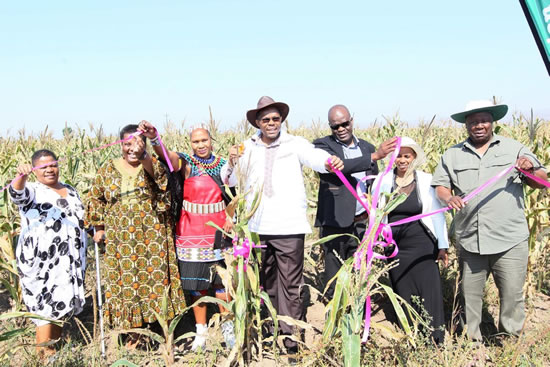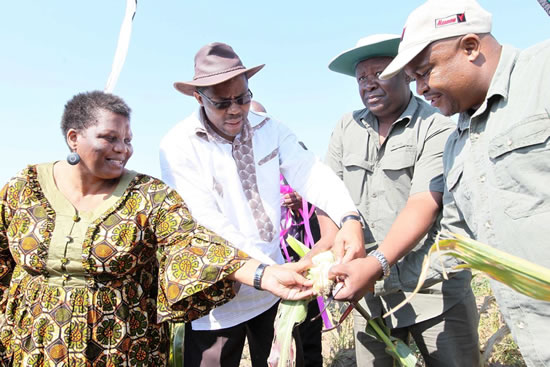A multi-million Rand Cluster Maize and Bean Project in KwaZondi, in Nkandla, north of KwaZulu-Natal, is set to help residents participate in the agricultural economy.
 The KwaZondi Cluster will be supported with up to 200 hectares of land, with 150 hectares for bean production and 50 hectares for maize, at a total budget of R2 250 000. Currently, the KwaZondi Cluster has planted 50 hectares of maize at tasseling stage and 81 hectares of beans.
The KwaZondi Cluster will be supported with up to 200 hectares of land, with 150 hectares for bean production and 50 hectares for maize, at a total budget of R2 250 000. Currently, the KwaZondi Cluster has planted 50 hectares of maize at tasseling stage and 81 hectares of beans.
The KwaZondi Cluster is a communal estate under the new strategy for Agrarian Transformation in KwaZulu-Natal.
In the uThungulu District Municipality, the Department of Agriculture and Rural Development identified five communal estates to support for crop production in the 2015/16 financial year - Yanguye Cluster (Soshuka), Ntumeni Vuma Mombeni Ngudwini, Masundwini Mbongolwane, Biyela Progressive and KwaZondi Cluster - as part of government’s Comprehensive Rural Development Programme (CRDP) that aims to tackle issues such as under development, food security, unemployment, poverty and other social ills in rural areas.
Speaking to Vuk’uzenzele, KZN MEC for Agriculture and Rural Development Cyril Xaba said that in KwaZondi small farmers had joined together and joined their plots.
“They formed a cluster or farming cooperative. Instead of growing a variety of different crops and competing with each other, they concentrate on growing one commodity or crop and run their operation as a business. In this cluster it is maize and beans.
“Members in the KwaZondi Cluster, similar to cooperatives in other communal estates, are being treated as business owners in their own right. They are being skilled to become self-empowered, while at the same time getting the support that will allow them to grow quality crops and get access to markets,” said MEC Xaba.
 He added that the extent of support the department provided to the cluster would change over time.
He added that the extent of support the department provided to the cluster would change over time.
“In the first year the cluster gets 100 percent funding. By the second year, when the operation is beginning to stand on its feet, funding will be reduced to 50 percent. However, the farmers will not be left on their own. There will be support from the department in terms of empowering them with the latest scientific and business information to continuously improve and grow the farming operation. The department will assist the project to get their maize processed at a mill in Nquthu,” he explained.
The long-term plan is to build silos and a mill in the area so that the farmers have control over the processing, marketing and sales of their own products.
“We have found that there is a ready market for the beans in the area, but as production grows we will work with the farmers to find wider markets,” said the MEC.
Ntombifikile Zungu from the KwaZondi Cluster project said they were happy to receive financial assistance from government.
“We started this project four years ago but we were not able to plant crops on this large plot of land due to financial constraints. We used to hire tractors from other cooperatives but they charged us good money just to work the land. Now, with the help we have gotten from government, we will be able have our own tractors,” she said.
Nkandla Local Municipality Deputy Mayor Thokzani Ndlela said the municipality was very privileged that the KZN Department of Agriculture and Rural Development had chosen Nkandla for such a development.
“The people of Nkandla solely depend on the agricultural economy to provide for their families. Through this project Nkandla will not be the same again. As the project grows, there will be more job opportunities for the people,” he said.



 Facebook
Facebook Twitter
Twitter WhatsApp
WhatsApp